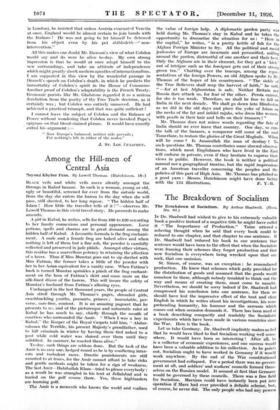Among the Hill-men of Central Asia
Y3eyond Khyber Pass. By Lowell Thomas. (Hutchinson. 180
BLACK veils and white veils move silently amongst the throngs in Kabul bazaar. In each is a woman, young or old, ugly or beautiful, screened for ever from the outside world, from the day she enters the harem to the day when she will pass, still sheeted, to her long repose. " The hidden half of Islam ! How little the traveller tells of it ! "‚ÄĒobserves Mr. Lowell Thomas in this vivid travel story. He proceeds to make amends.
A girl in Kabul, he writes, sells for from £00 to £20 according to her family connexions and personal appearance. Love potions, spells and charms are in great demand among the hidden half of Kabul. A favourite formula is the frog enchant- ment. A male and a female frog are baked alive and when nothing is left of them but a fine ash, the powder is carefully collected and preserved in jade phials. Amongst other virtues, this residue has a marvellous potency in retaining the affection of a lover. Thus if Miss Mumtaz goes out to sip sherbet with Miss Fatima, the former takes a little of the powder with her in her Asian equivalent for a vanity case. When Fatima's back is turned Mumtaz sprinkles a pinch of the frog enchant- ment on the hem of Fatima's skirt and some more on the silk-lined divan of the harem. This will insure the safety of Mumtaz's husband from Fatima's alluring eyes.
Unchanged in the last thousand years, the people of Central Asia stroll through Mr. Thomas's pages, shrouded girls, swashbuckling youths, peasants, princes ; inscrutable, per- verse, care-free, content. It is an amazing pageant that he presents to us, and of the picturesque and autocratic ruler at Kabul he has much to say, chiefly through the mouth of courtiers who surrounded the Amin " When I was a boy in Kabul," the Keeper of the Royal Carpets told him, " Abdur- rahman the Terrible, his present Majesty's grandfather, used to kill criminals in winter by having them tied naked to a post while cold water was sluiced over them until they solidified. In summer, he roasted them alive."
To-day, such things are seldom done. But the task of the Amir is no easy one, hedged round as he is by conflicting inter- ests and turbulent races. Drastic punishments are still resorted to at times, for the Amir cannot afford to take risks and gentle methods might be taken for a sign of weakness. The last Amir‚ÄĒHabibullah Khan‚ÄĒtried to please everybody as a result lie was strangled in his tent at Jellalabad and is buried on the golf course , there.. Yes, these highlanders are learning golf.
The Amir is a monarch who knows the world and realizes
the value of foreign help. A diplomatic garden party was held during Mr. Thomas's stay in Kabul and he takes the opportunity to dramatize the situation for us : " Here in the capital," he writes, " is a pretty kettle of fish for the Afghan Foreign Minister to fry. All the political and racial jealousies of Europe are incarnate and personified, milling around the garden, distrustful of one another and their host. Only the Afghans are in their element, for they get a ' kick' out of intrigue such as the foreigner gets out of their strong green tea." Chatting over the teacups, among the repre. sentatives of the foreign Powers, an old Afghan spoke to Mr. Thomas of the hopes of his countrymen. " The sickle of the True Believers shall reap the harvest of faith," he said, " ‚ÄĒfor at last Afghanistan is safe. Neither Britain nor Russia dare attack us, for fear of the other. Persia cannot, for she is too weak. Therefore, we shall be free to fall on India in the next decade. We shall go down into Hindustan as we did in the old days and place the yoke of Islam on the necks of the fat and infidel rajahs, who dress like women, with pearls in their hair and bells on their trousers 1"
Mr. Thomas does not mince words regarding the fate of India should we ever leave that country. One day, so runs the talk of the bazaars, a conqueror will come of the seed Tamerlane, to restore the glories of the Great Moghuls. When will he come ? Is Amanullah the man of destiny ? To such questions Mr. Thomas contributes some shrewd observa- tions, which most Englishmen who have lived in the East will endorse in private, even if they hesitate to express their views in public. However, the book is neither a political manual nor a geographical treatise, but the rapid impressions of an American traveller concerning the peoples and the policies of this part of High Asia. Mr. Thomas has pitched us a good yarn : Messrs. Hutchinson might have done better














































 Previous page
Previous page